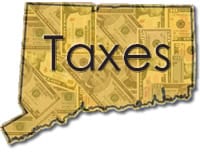 Changes for Connecticut Residents
Changes for Connecticut Residents
When you open your paycheck in August you will notice that it’s smaller. The new CT income tax deduction took effect August 1, but it went into effect retroactively from January 1st (7 months past).
With only five months left in the calendar year, the money has to be made up. From now until the end of the year, you will be having more than double the CT income tax withdrawn from your paycheck to catch up.
Come January 1, 2012, you will go back to paying the regular new income tax amount.
Check with your tax preparer, but it is my understanding that the tax increase will not affect you if you are filing your taxes as single and earn less than $50,000, or married and earn less than 100,000. If that’s you, you won’t see a difference in your paycheck now or in January.
Connecticut Sales Tax Increases
No matter your tax bracket, you will be paying more sales tax when you shop in CT. In case you didn’t know, CT shoppers are now paying 6.35% as of July 1 (up from 6%). And you will pay it on more items. Some items that were tax exempt in the past are now taxable. For example, you didn’t used to pay sale tax on clothing under $50, but now you will as you shop for back-to-school. Remember that there is a tax-free week for clothing from August 21 to 27 for purchases under $300.00, so you may want to plan your shopping ahead.







